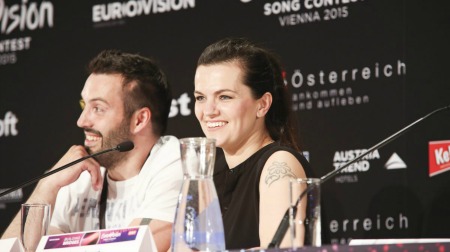One thing that’s really struck me about my time in Vienna is how anxious the citizens are to know that I’m getting a positive impression of their city. I’m not just talking about the volunteers in the press centre – whether I’m at a restaurant, a club or a 5am schnitzel stand, every Austrian I’ve spoken to has slightly nervously asked if I’m having a good time here.
They have little reason for concern, as aside from an unfortunate incident on their underground system (if you take one thing away from this blog series, let it be this – always validate your ticket. Austrian transport officials have zero tolerance for idiots abroad) the Vienna experience has been an absolute delight. That it’s a beautiful city goes without saying, but the organisation by the Austrian team has been exceptional. There’s a real feeling that the country has embraced this experience in a big way, something I wasn’t necessarily expecting given their occasionally indifferent pre-Conchita engagement with the contest.
Today we run through the second semi final in its entirety, meaning another frantically paced afternoon of press conferences. With so many big hitters and fan favourites performing in this semi, it looks set to be an eventful day, and so it proves. Marta and Václav from the Czech Republic continue to display the best attitude of any team in the contest this year. Not only are they hysterically funny, they’re also disarmingly frank about the lack of interest in Eurovision from their home country. Marta expresses frustration that their song is not being played on Czech radio and they’ve received next to no support from local media, comparing her country to “a child who’s received nothing for Christmas three years in a row and has now decided that he never liked Christmas anyway”. Coming from the UK, I can certainly relate…

If Eurovision had a Miss (and Mister) Congeniality prize, Marta & Václav from the Czech Republic would walk away with it…
Photo: Eurovision.tv
One of the sweetest exchanges of the day occurs during Israel’s press conference when a young fan from the Lebanon talks about the long-running conflict between the two countries and thanks Nadav for helping him to bond with an Israeli friend over their shared love of the contest. A visibly moved Nadav invites him to the stage where they share a tearful hug and pose together with their respective national flags. It’s a great PR moment, no question, but also a powerful reminder that the theme of building bridges through Eurovision has the potential to be more than just a slogan.
Another nice moment comes courtesy of the Azerbaijani singer, who wears a Conchita Wurst T-shirt during his rehearsal and displays it prominently in the press room. He talks about how moved he was by Conchita’s performance last year, and explains that he feels his own entry shares a similar message to Rise Like a Phoenix. Azerbaijan’s approach to human rights is often portrayed in a rather negative light – and not without justification – but Elnur is proving to be an excellent ambassador for a more enlightened, progressive side of the country.
As a Melodifestivalen geek and shameless social climber, I’m determined to get some face time with Swedish HoD and Eurovision God Christer Björkman by hook or by crook. It’s a packed conference, but I’ve become friendly with hostess Riem Higazi over the past few days, and she takes pity on my frantic waving from the front row. Based on the massive success of Melodifestivalen, I ask Björkman what advice he would give to countries that struggle to attract similarly high-calibre artists and songwriters. He replies that you have to approach it from a place of genuine love, and demonstrate to the artists that it really can be a good career opportunity – citing Loreen as a classic example. Is it too much to hope that somebody from the BBC was in attendance?
One of the little-known occupational hazards of the Eurovision experience is a condition I’m going to dub ‘Journo’s Spine’. After twelve hours of hunching forwards in a plastic chair, my upper back feels like there’s a small family of hedgehogs nestling in my muscle tissue. I gloomily mention this to a journalist from Germany while we wait for the Polish press conference to begin, and he proceeds to treat me to an impromptu massage right there in the room. It’s a fittingly surreal note on which to end the day.











One thing the BBC could do is to guarantee airplay for Eurovision acts on Radio 1, 2 or 6Music. If they knew they would be playlisted, that would be a big attraction. There’s no reason why a song relevant to any of those stations would not be allowed at the contest. Sadly, the reverse is not true and that is what must change. I had hoped that the involvement of Scott Mills might change the picture, but he doesn’t seem to be doing anything to promote the music in the contest to his listeners, or producers.
Could it be that the Lebanese moment was staged ? I wouldn’t be surprised. I also feel that Elnur was probably just looking for more votes with his tee-shirt stunt.